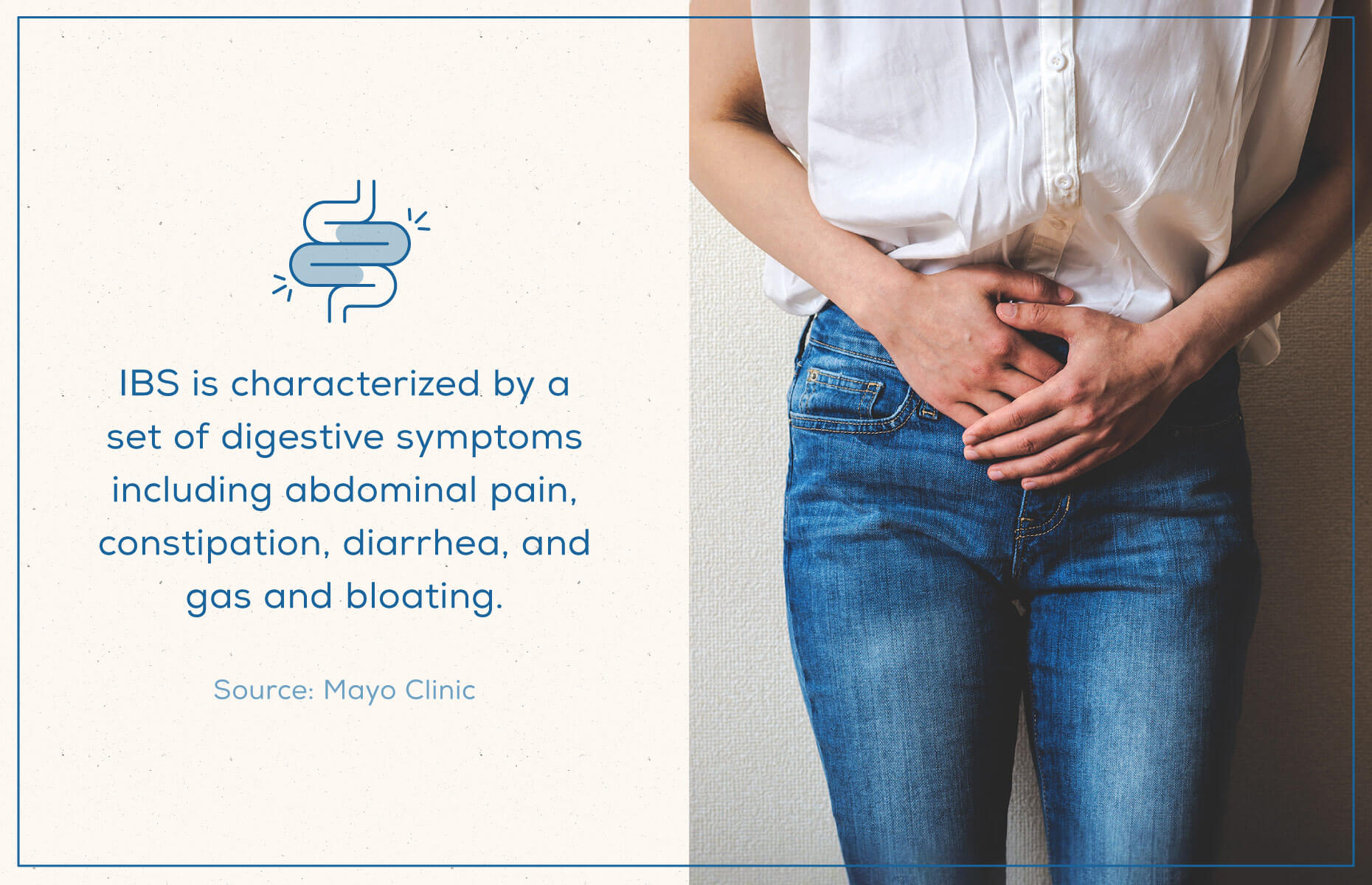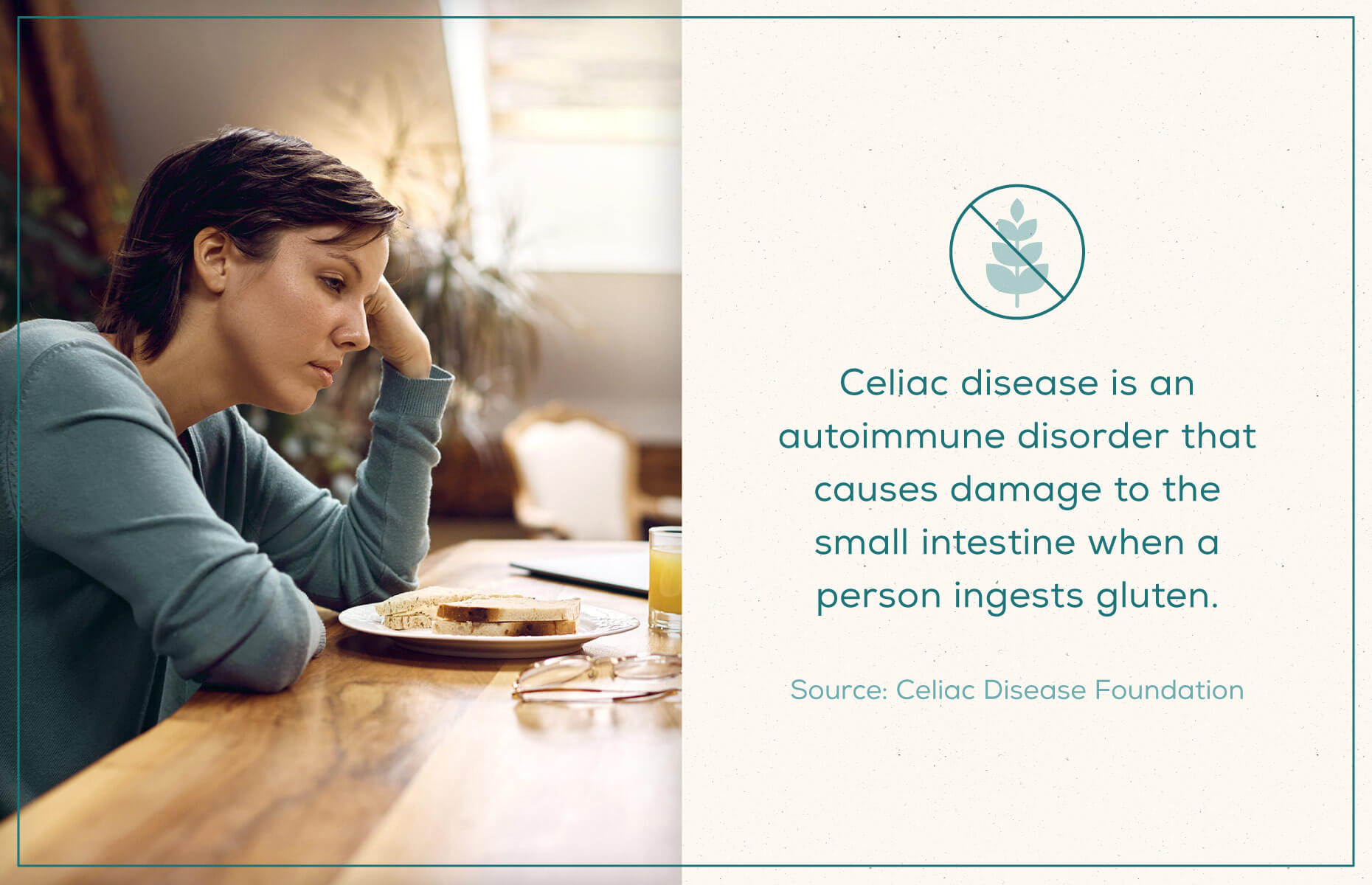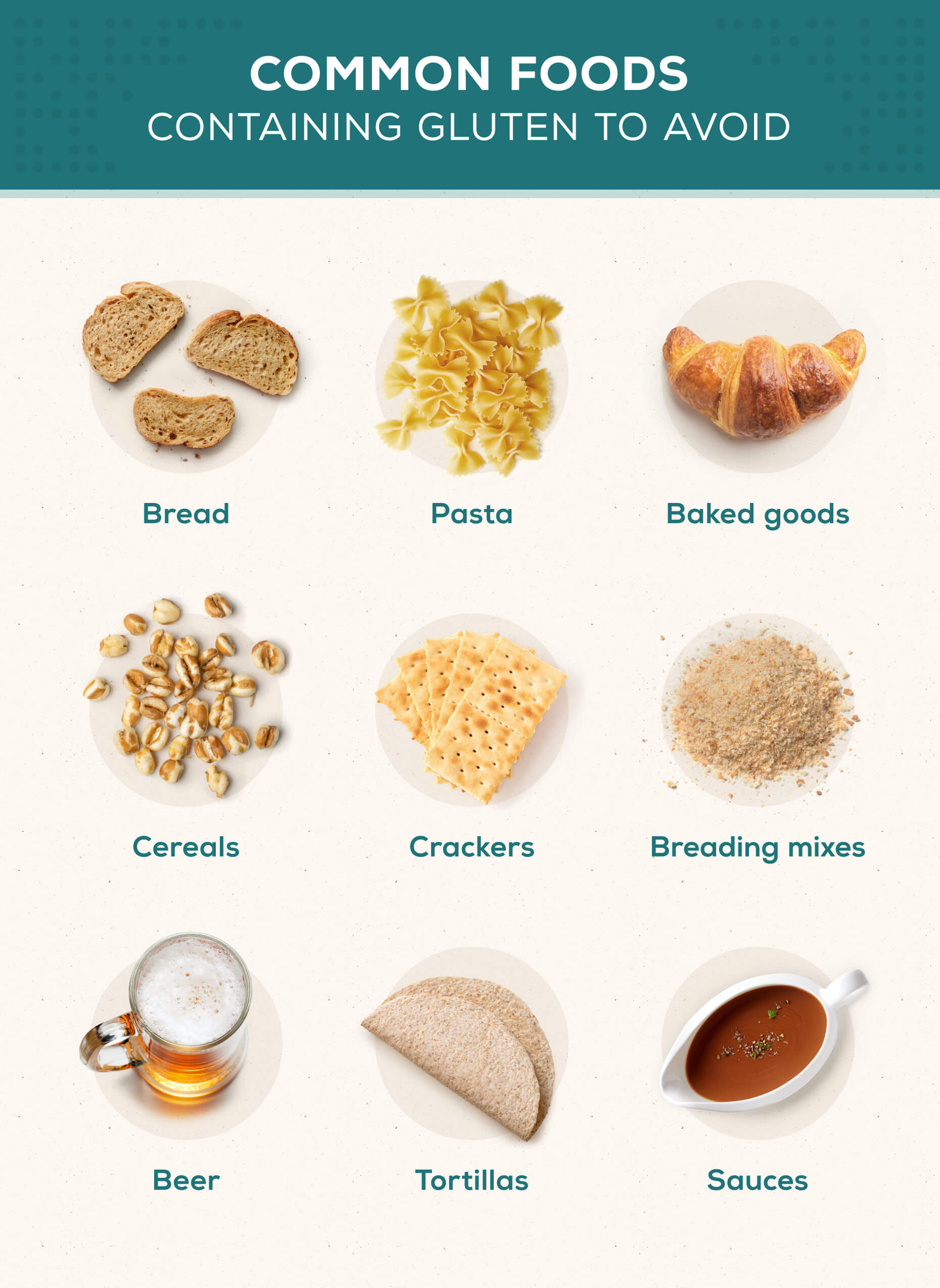
IBS vs. Celiac Disease vs. Gluten Sensitivity: Understanding the Differences
Medically reviewed on May 23, 2022 by Jordan Stachel, M.S., RDN, CPT. Last updated January 13, 2023. To give you technically accurate, evidence-based information, content published on the Everlywell blog is reviewed by credentialed professionals with expertise in medical and bioscience fields.
Table of contents
- What Is IBS?
- What Is Celiac Disease?
- What Are the Treatment Options for IBS and Celiac Disease?
- Celiac Disease vs. Non-Celiac Gluten Sensitivity
- Tips for Staying Healthy
- When to Contact a Healthcare Provider
If you experience digestive issues that keep coming back after eating certain foods, you may be wondering if they could be connected to a disorder like irritable bowel syndrome (IBS), celiac disease, or even a gluten sensitivity. These conditions all affect the digestive tract and can cause symptoms like diarrhea, constipation, and bloating, so it can be difficult to tell them apart (but a Celiac Disease Screening Test can help).
That said, IBS and celiac disease are separate conditions with different symptoms, diagnostic criteria, and treatment options. If you’re curious about what sets them apart, read on to learn more about these conditions.
What Is IBS?
IBS is a common condition that primarily affects the large intestine and colon. It’s characterized by a set of digestive issues, including abdominal pain, gas, and bloating related to bowel movements that linger for a long period of time. Healthcare providers aren’t sure what causes IBS and there is no cure, but long-term diet and lifestyle changes can help manage symptoms.

IBS is often divided into three types based on which symptoms are present: diarrhea-predominant, constipation-predominant, or mixed. Because IBS refers to a group of symptoms rather than a specific disease, healthcare providers often refer to these types when recommending treatment options.
Common Symptoms
IBS symptoms can vary from person to person. If you have IBS, you might notice that symptoms change over time or vary in severity. While the following symptoms can have multiple causes, they may point to IBS if they persist for long periods of time.
- Abdominal pain and cramping
- Bloating
- Increased gas
- Chronic diarrhea or constipation
- Change in appearance of bowel movements
For many people with IBS, consuming certain foods or beverages triggers symptoms or makes them worse. IBS is not directly tied to food allergies or intolerances, but some people report that products like dairy, beans, citrus fruits, cabbage, and carbonated drinks make symptoms worse. Experiencing increased stress can also aggravate symptoms or increase their frequency.
Diagnosis
There is currently no way to test for IBS, and it can be difficult to identify since it doesn’t leave any signs of damage or disease in the digestive tract. However, healthcare providers may reach a diagnosis by asking about your symptoms and running tests to rule out food allergies, intolerances, and/or other conditions.
When discussing symptoms, healthcare providers often use the Rome criteria to diagnose IBS. This set of criteria includes abdominal pain or discomfort associated with a change in stool consistency or frequency for at least one day a week in the last three months.
If your healthcare provider suspects that you have IBS, they may ask about other aspects of your family and medical history that could increase your chances of having the condition. People with IBS often experience other health issues, including chronic pain conditions, digestive diseases, and mental health disorders like depression and anxiety. Women are also twice as likely as men to develop IBS and having a family member who has it could increase your risk.
What Is Celiac Disease?
Celiac disease is an autoimmune disorder that causes damage to the small intestine when a person ingests gluten. It affects roughly 1 in 100 people worldwide, and it’s a hereditary disease that can cause long-term health complications if left untreated. People with a parent, sibling, or child with celiac disease have a 1 in 10 chance of developing it.

When a person with celiac disease ingests gluten, it triggers an immune response that attacks the small intestine and damages villi, the small fingerlike projections responsible for absorbing nutrients into the body. Over time, this can prevent the body from getting the nutrients it needs and cause serious complications, including chronic fatigue, weight loss, anemia, and lack of growth in children.
Common Symptoms
Symptoms of celiac disease can present differently in children and adults and may vary from person to person. Children are more likely to experience digestive issues while adults may be more prone to joint pain and bone density loss. Some common signs and symptoms include:
Adults
- Diarrhea
- Constipation
- Abdominal pain and discomfort
- Gas and bloating
- Weight loss
- Headaches
- Fatigue
- Nausea and vomiting
- Anemia
- Joint pain
- Loss of bone density
- Skin rashes that itch and blister
- Numbness in the feet and hands
- Cognitive issues
- Mouth ulcers
- Seizures
Children
- Nausea and vomiting
- Pale, foul-smelling stools
- Gas and bloating
- Chronic diarrhea or constipation
- Damage to tooth enamel
- Weight loss
- Failure to thrive (in infants)
- Irritability and attention issues
- Delayed puberty
- Stunted growth
While many conditions can cause these symptoms, they may point to celiac disease if they get worse after eating foods that contain gluten. If you notice any of these symptoms after you or your child eats foods containing wheat, barley, or rye, you should talk to your healthcare provider right away.
Diagnosis
If your healthcare provider suspects that you have celiac disease after reviewing your symptoms, they will likely order further testing. Two types of blood tests can help diagnose celiac disease: serology testing and genetic testing.
Serology testing looks for certain antibodies in the blood that indicate an immune response to gluten. If these antibody levels are elevated, your healthcare provider will likely order further testing to confirm the results. It’s important to tell your healthcare provider about the types of foods you’ve eaten recently before taking this test. If you cut out gluten before testing, your results might not be accurate.
Genetic blood testing looks for the human leukocyte antigens HLA-DQ2 and HLA-DQ8. People with celiac disease carry one or both genes, making this test useful for those who want to know their risk of developing the disease. However, around 25-30 percent of people without celiac disease also have one or both of these genes, so healthcare providers don’t use this test as a diagnostic tool. They often recommend it for people who have a parent, sibling, or child with celiac disease to see if they are genetically predisposed to the condition.
If you prefer to start the testing process at home, you can order a celiac disease screening test kit. These tests start by screening for the presence of the biomarker tTg-IgA. Because a small percentage of the population has low levels of IgA, it is tested in tandem with tTg-IgA, to rule out IgA deficiency causing a false negative. If IgA levels are in fact low, the sample is then tested for the antibody DGP-IgG, another marker that indicates elevated risk of celiac disease.
If your blood test and symptoms point to celiac disease, your healthcare provider will likely order an endoscopy or capsule endoscopy to confirm the diagnosis. These tests use a small camera to view the small intestine and look for signs of damage. If your healthcare provider orders an endoscopy, they may also take a tissue sample to look for damaged villi.
What Are the Treatment Options for IBS and Celiac Disease?
While there is no cure for IBS or celiac disease, many people living with these conditions find that certain lifestyle changes and treatment options can improve symptoms and their quality of life.
IBS Treatment
IBS is a chronic condition, but there are treatment options that can help manage symptoms. If you aren’t sure what is triggering your symptoms, your healthcare provider may recommend reducing stress, exercising regularly, or making changes to your diet. For some people, changes like avoiding gluten, eating more fiber, or following a low-FODMAP elimination diet help identify triggers and ease symptoms.
Anxiety, depression, and emotional stress can also have a significant impact on the severity and frequency of IBS symptoms. If your symptoms worsen during periods of emotional distress or heightened anxiety, your healthcare provider may refer you to an experienced therapist or recommend other mental health resources.
If symptoms persist despite lifestyle and diet changes, there are medications that can help. Some of the most common medications used to treat IBS include:
- Laxatives: These medications can provide relief for people suffering from IBS-related constipation.
- Antidiarrheal medications: Healthcare providers may recommend these for people who experience persistent diarrhea.
- Smooth muscle relaxants: These can be prescribed to help reduce and prevent intestinal cramping caused by IBS.
- Antidepressants: Low-dose antidepressants can make the nervous system less reactive to stress and certain foods, reducing symptoms like pain and diarrhea.
- Probiotics: Research suggests that an imbalance of healthy bacteria in the gastrointestinal tract could contribute to IBS in some people. Taking probiotics helps restore this balance and may improve IBS symptoms like gas and bloating.
Celiac Disease Treatment
Because there is no cure for celiac disease, cutting gluten from your diet is the best way to manage symptoms and prevent serious complications. Anything with wheat, barley, rye, triticale, malt, or unprocessed wheat starch in the ingredient list contains gluten, so you should always check product labels before you buy them. Some of the most common foods that contain gluten include:
- Bread
- Pasta
- Pastries and baked goods
- Cereals
- Crackers
- Pancakes, waffles, and French toast
- Breading mixes
- Beer and brewer’s yeast
- Tortillas
- Sauces and gravies thickened with wheat flour

Gluten can show up in foods that you wouldn’t expect. If you’re eating out, you should ask restaurant staff to verify which menu items contain gluten. Recipes can vary widely, and many restaurants offer a gluten-free menu for diners with celiac disease or gluten sensitivities.
Celiac Disease vs. Non-Celiac Gluten Sensitivity
It can be easy to confuse celiac disease with non-celiac gluten sensitivity or a wheat allergy. These conditions are all triggered by foods that contain gluten and may share some symptoms. However, they are different conditions with varying diagnostic criteria and treatment options.
While celiac disease triggers an autoimmune response that damages tissues, a non-celiac gluten sensitivity doesn’t cause long-term damage. Common symptoms of non-celiac gluten sensitivity include diarrhea, bloating, stomach pain, nausea, fatigue, headaches, confusion, and joint pain.
If you are experiencing these symptoms but your healthcare provider has ruled out celiac disease and non-celiac gluten sensitivity, they may recommend testing for a wheat allergy. Wheat allergies can share symptoms with both conditions, including headache, stomach pain, vomiting, and diarrhea.
A wheat allergy can also cause hives, difficulty breathing, swelling, or itching in the mouth and throat, chest pain, and anaphylaxis. If you experience any of these symptoms after eating foods that contain wheat, you should talk to your healthcare provider right away. They may order a skin test for allergic reactions or a blood test to identify antibodies associated with wheat allergies.
Tips for Staying Healthy
If you are experiencing abdominal pain or other digestive issues, you should make an appointment to discuss your concerns with a healthcare provider. They may recommend testing for celiac disease, allergies, or food sensitivities that could trigger your symptoms. If you have celiac disease, early testing is essential to avoid long-term complications.
You can also order an at-home Food Sensitivity Test or Food Sensitivity Comprehensive Test to identify types of foods that may be causing unpleasant symptoms related to food sensitivities. These tests don’t screen for celiac disease, but the results can help identify foods (including gluten) to include in a temporary elimination diet and/or bring up to your healthcare provider later.
Once you have a diagnosis, be sure to ask your healthcare provider which diet and lifestyle changes they recommend. Many people successfully manage symptoms by cutting out foods that trigger symptoms, exercising regularly, and reducing stress. Keeping a food journal is a great way to keep track of what you eat and avoid foods that might trigger symptoms.
When to Contact a Healthcare Provider
You should talk to your healthcare provider if you experience digestive discomfort, diarrhea, or constipation that lasts for more than two weeks. If celiac disease runs in your family, you should ask your healthcare provider about testing options even if you aren’t experiencing symptoms. Some people don’t notice symptoms until later in life, and early detection reduces the risk of long-term complications.
IBS and celiac disease share some of the same symptoms, but knowing the differences can help you better understand your body and communicate your concerns to your healthcare provider.
If you think your symptoms might be connected to your diet, consider ordering an at-home celiac disease screening test and bring your celiac disease blood test results to your next appointment.
Article Sources
- Irritable Bowel Syndrome (IBS). National Institute of Diabetes and Digestive and Kidney Diseases. URL. Accessed April 12, 2022.
- Irritable Bowel Syndrome Treatment. Johns Hopkins Medicine. URL. Accessed April 12, 2022.
- Definition and Facts for Irritable Bowel Syndrome. National Institute of Diabetes and Digestive and Kidney Diseases. URL. Accessed April 12, 2022.
- Probiotics—Even Inactive Ones—May Relieve IBS Symptoms. Harvard Health Publishing. URL. Accessed April 12, 2022.
- Celiac Disease. Mayo Clinic. URL. Accessed April 12, 2022.
- About Celiac Disease. Celiac Disease Foundation. URL. Accessed April 12, 2022.
- Wheat Allergy. Mayo Clinic. URL. Accessed April 12, 2022.
